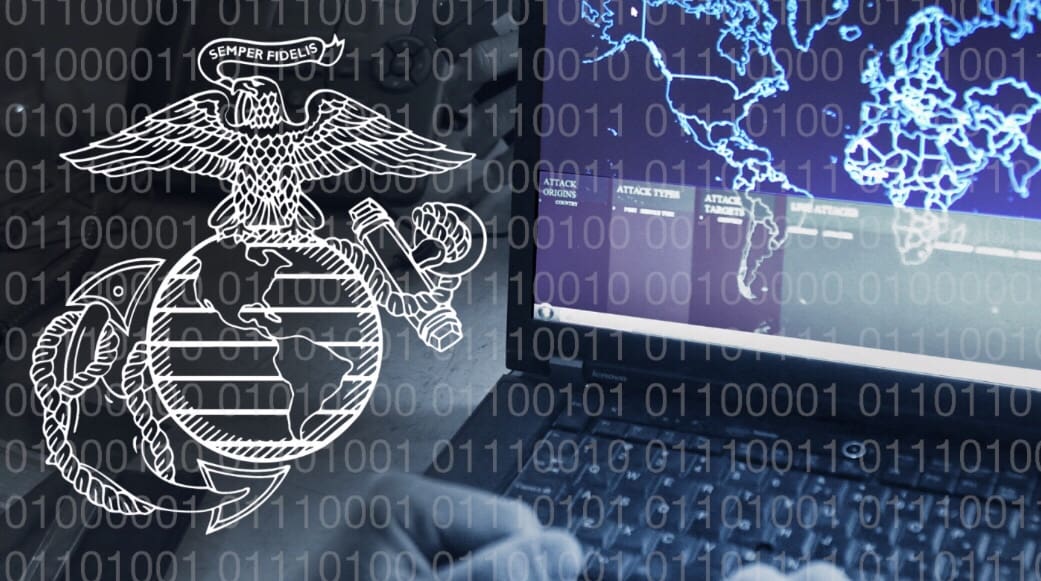CAMP PENDLETON, Calif.—Command and control must be assured anywhere the Marine Air Ground Task Force operates, which requires in-depth testing to deliver success on the battlefield.
Cyber security experts and engineers from Marine Corps Tactical Systems Support Activity recently tested various systems within the Marine Corps Enterprise Network, or MCEN, to assess interoperability and cyber resiliency.
“MCTSSA started executing mission-based systems tests as a means to aid Marine Corps acquisition programs in security engineering and ensure our capabilities can perform in cyber-contested environments,” said Jimmy Clevenger, MCTSSA senior principal engineer for Cyber Security.
This mission-based system of systems testing is one of the functions of the MCEN Planning Yard.
The MPY evaluates proposed changes to the MCEN from a performance, interoperability, and cyber security perspective. The MPY testing takes a big-picture approach to validate network processes, provide baseline performance characteristics and conduct an adversarial cyber vulnerability assessment.
“The MPY capability is a great test and analysis service that informs leadership of the impacts imposed on the MCEN’s core services of transport, processing and storage,” said Clevenger.
MCTSSA conducted the cyber resiliency tests in April and May, and delivered a final report of the results to Marine Corps Systems Command programs of record as well as Marine Forces Cyberspace Command and Headquarters Command, Control, Communications, and Computers, United States Marine Corps stakeholders in June.
Specific testing measured the impacts and cyber resiliency of several command and control programs that are connected to the MCEN.
“We collected performance metrics such as network utilization and throughput,” said Paul Tice, MCTSSA technical director. “This enables us to measure the impact of future changes.”
These tests have expanded in size, scope and complexity as MCTSSA looked at different warfighting functions and the systems that support them.
Large scale network tests are a big undertaking, and under the direction of MCSC, MCTSSA formed a federation of technical organizations to aid in the detailed analysis, including: SPAWAR Systems Center (SSC) Atlantic; SSC Pacific; Naval Surface Warfare Center – Crane Division; and Portfolio Manager, Supporting Establishment Systems, Systems Integration Lab.
“System of systems tests are challenging, and we decided to take a crawl, walk, run approach as we developed the current capability here at MCTSSA,” said Clevenger.
MPY testing facilitates the maintenance of the MCEN by enabling a technical evaluation process of proposed hardware and software changes within the MCSC portfolio to determine the impact of those changes to the network.
“The goal of the MPY is to technically evaluate changes to the MCEN before they are introduced,” said Tice. “The idea is to determine whether a proposed change impacts the performance or security posture of the MCEN and recommend mitigation steps before the change is implemented.”
One of the side benefits is enterprise awareness of the changes happening to the network.
“Each program office is extremely busy delivering their particular product to the MAGTF, and often don’t have time to see what is changing in the other systems that share their environment,” said Tice.
This strategic look at the MCEN aids future planning and gives a better understanding of current network capability.
“We have established a measurement of the Marine Corps’ Aviation C2 systems’ impact to the MCEN and have preliminary formulas that can estimate the bandwidth required for these systems in a Tactical Air Operations Center role,” said Darren Spies, test director for MCTSSA’s Test and Certification Group. “For future planning efforts of the MCEN, this information will be useful when gauging further impacts of modifications made to existing systems or incorporating any future systems into the architecture.”
By evaluating the impact of various C2 tools on the MCEN, MCTSSA provides the data leaders need to deliver a C2 environment for tomorrow’s Marine Corps today.
MCTSSA, the only elite full-scale laboratory facility operated by the Marine Corps, is a subordinate command of Marine Corps Systems Command. MCTSSA provides test and evaluation, engineering, and deployed technical support for Marine Corps and joint service command, control, computer, communications and intelligence systems throughout all acquisition life-cycle phases.

Marine Corps Tactical Systems Support Activity personnel tested various systems within the Marine Corps Enterprise Network as part of the MCEN Planning Yard 18-1 event. MCTSSA started executing mission-based system of systems tests as a means to aid programs of record in security engineering and cyber resiliency. (U.S. Marine Corps illustration by Jennifer Sevier)
By Sky M. Laron, Public Affairs Officer, MCTSSA

